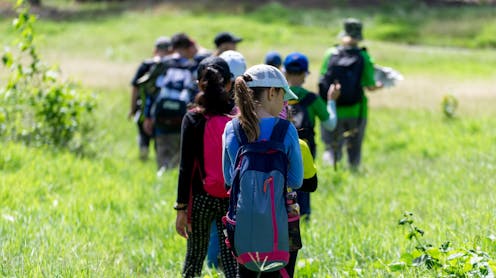Detta inlägg post publicerades ursprungligen på denna sida this site ;
Date:
Author: Micah Boerma, Researcher, School of Psychology and Wellbeing, University of Southern Queensland
Original article: https://theconversation.com/is-your-child-anxious-about-going-on-school-camp-here-are-4-ways-to-prepare-252290
One of the highlights of the school year is an overnight excursion or school camp. These can happen as early as Year 3.
While many students are very excited about the chance to go away with their classmates, some may experience anxiety and even fear about being away from home and their usual routines.
Anxiety disorders are the second most common mental disorder among children and adolescents in Australia. One in 14 young people are affected.
Separation anxiety (fear or dread about being separated from caregivers) is the most common anxiety disorder amongst young people in Australia. This affects about 4% of young people aged four to 17. Students with anxiety may refuse to attend the camp. Or they may go and not participate in activities or have periods of intense anxiety.
While these trips are a small part of a young person’s school year, positive and negative experiences can form important beliefs about their self-confidence and independence.
Here are four ways to prepare your anxious child to attend and enjoy camp.
1. Understand the anxieties
Anxiety isn’t a one-size-fits-all condition. For one child, it may be the fear of not fitting in or the dread of being homesick. For another, it may be the fear of being away from parents, believing something bad will happen.
So the first step is to really listen to a child about their anxietty.
Asking open-ended questions, such as “what is the one thing about going to camp that worries you most?” can help to determine their core fear.
When they tell you, avoid jumping in quickly to reassure them they “will be fine”. This can feel dismissive and invalidate their concerns.
Instead, reflect what you hear so they feel understood. For example, “I hear you a really worried about what it will be like to spend the night away from us. You’ve never done this before.”
Andrew Angelov/Shutterstock
2. Understand the ‘cycle of avoidance’
Anxious people tend to overestimate the likelihood of something terrible happening and underestimate their ability to cope if it occurred.
When a young person sidesteps something scary, they feel initial relief. But this avoidance prevents them from learning the feared situation may not be as dangerous as think. Importantly, they do not get the opportunity to test their coping skills and build confidence. This inadvertently increases their anxiety.
It can help to talk to your child about how avoiding camp might feel better in the short term but it makes fun activities – such as sleepovers or trips – harder in the future.
4. Build the ‘bravery muscle’
You also might want to talk about how you can build the “bravery muscle”.
This involves gradually exposing a child to their fears and building confidence in their ability to cope. This way fears lose their power.
Start with easier tasks. For example, if the main worry is “something bad will happen to mum and dad if I am not with them at night”, start with your child staying with a grandparent while you go out for dinner. Then you could try staying overnight at a grandparent or a trusted friend’s house.
You can also pair these tasks with coping tools. Your child could do a breathing exercise or a grounding excercise, where they focus on things around them, rather than the thoughts and feelings distressing them.
When organising these tasks, it is crucial parents acknowledge the distress their child might experience, while communicating their confidence the child can do it.
Celebrate every effort and task completed, no matter how small.
NataliyaBack/Shutterstock
4. Make a plan with school
Parents and caregivers are not in this alone. So make sure you talk to your class teacher or year group leader if you haven’t already. Some helpful tips are:
-
organise a “camp buddy” for the bus ride or to share a tent/room with
-
organise a “go-to” teacher for your child to gain support from during camp
-
access information about the accommodation and activities as soon as possible so you can practice. This could include your child camping in a tent with a friend, bike riding, or bush walking.
It’s not expected the steps above will erase your child’s anxiety entirely – that is not realistic. But they can give them coping tools to face their anxiety and come out the other side stronger. School camps can be an exciting experience where a young person may discover they are braver than they thought.
Micah Boerma does not work for, consult, own shares in or receive funding from any company or organisation that would benefit from this article, and has disclosed no relevant affiliations beyond their academic appointment.
